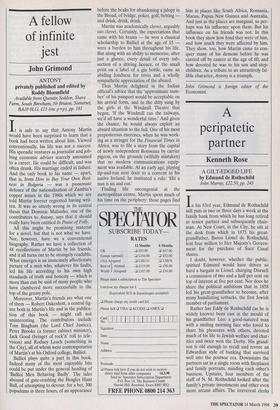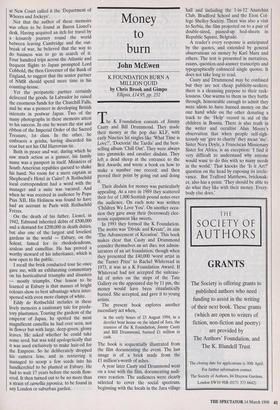A peripatetic partner
Kenneth Rose
A GILT-EDGED LIFE by Edmund de Rothschild John Murray, £22.50, pp. 243 I n his 83rd year, Edmund de Rothschild still puts in two or three days a week at the family bank from which he has long retired as senior partner and subsequently chair- man. At New Court, in the City, he sits at the desk from which in 1875 his great- grandfather, Baron Lionel de Rothschild, lent four million to Her Majesty's Govern- ment for the purchase of Suez Canal shares.
I doubt, however, whether the public- spirited Edmund would have driven so hard a bargain as Lionel, charging Disraeli a commission of two and a half per cent on top of interest at five per cent. Nor does he share the political ambitions that in 1858 led his great-grandfather to become, after many humiliating setbacks, the first Jewish member of parliament.
Rather has Eddy de Rothschild (as he is widely known) been cast in the mould of his grandfather Leo: a good-natured man with a smiling morning face who loved to share his pleasures with others, devoted much of his life to Jewish welfare and char- ities and twice won the Derby. His grand- son is old enough to recall and revere an Edwardian style of banking that survived well into the postwar era. Downstairs the partners sat in a single room with fireplaces and family portraits, minding each other's business. Upstairs, four members of the staff of N. M. Rothschild looked after the family's private investments and other even more arcane affairs. The irreverent clerks at New Court called it the 'Department of Whores and Jockeys'. Not that the author of these memoirs was often to be found at Baron Lionel's desk. Having acquired an itch for travel by a leisurely journey round the world between leaving Cambridge and the out- break of war, he believed that the way to do business was to go in search of it. Four hundred trips across the Atlantic and frequent flights to Japan prompted Lord Cobbold, the then Governor of the Bank of England, to suggest that the senior partner of NMR should spend more time in his counting-house. Yet the peripatetic partner certainly delivered the goods. In Labrador he raised the enormous funds for the Churchill Falls, and he was a pioneer in developing British interests in postwar Japan. Two of the many photographs in these memoirs attest to his success. In one he wears the star and ribbon of the Imperial Order of the Sacred Treasure, 1st class. In the other, he embraces a geisha, having discarded his coat but not his Old Harrovian tie.
Both in peace and war, during which he saw much action as a gunner, his family name was a passport in itself. Ministers of South American republics queued to shake his hand. No room for a mere captain at Shepheard's Hotel in Cairo? A Rothschild local correspondent had a word with the manager and a suite was vacated. And when he was received in audience by Pope Pius XII, His Holiness was found to have had an account in Paris with Rothschild Freres.
On the death of his father, Lionel, in 1942, Edmund inherited debts of £500,000 and a demand for £200,000 in death duties, but also one of the largest and loveliest gardens in the world — Exbury, on the Solent, famed for its rhododendrons, azaleas and camellias. He has proved a worthy steward of his inheritance, which is now open to the public. I recall the brisk conducted tour he once gave me, with an exhilarating commentary on his horticultural triumphs and disasters — mostly triumphs. One lesson to be learned at Exbury is that masses of bright colours show to best advantage when inter- spersed with even more clumps of white. Eddy de Rothschild includes in these lively memoirs a cautionary tale for preda- tory plantsmen. Touring the gardens of the emperor of Japan, he spotted the most magnificent camellia he had ever seen, not in flower but with large, deep-green, glossy leaves. He asked whether he could take some seed, but was told apologetically that it was used exclusively to make hair-oil for the Empress. So he deliberately dropped his camera lens, and in retrieving it managed to scoop a few seeds into his handkerchief to be planted at Exbury. He had to wait 17 years before the seeds flow- ered. It then turned out to be no more than a strain of camellia japonica, to be found in any London or suburban garden.



































































 Previous page
Previous page